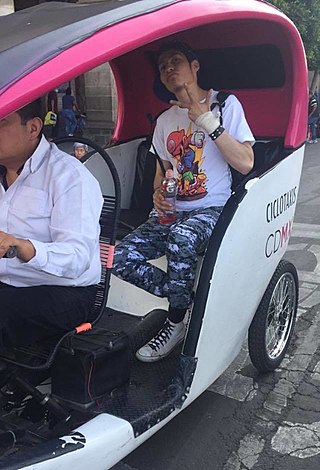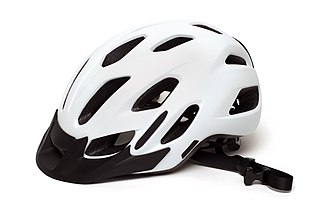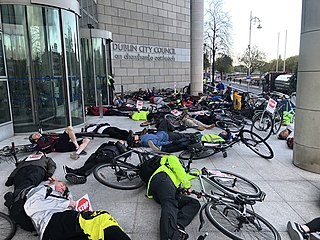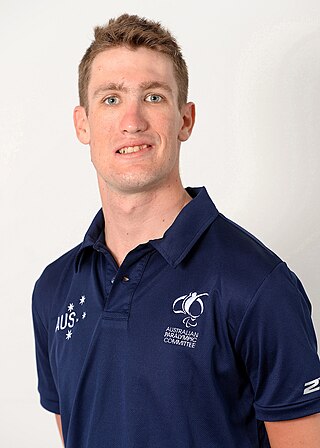
The cycle rickshaw is a small-scale local means of transport. It is a type of tricycle designed to carry passengers on a for-hire basis. It is also known by a variety of other names such as bike taxi, velotaxi, pedicab, bikecab, cyclo, beca, becak, trisikad, sikad, tricycle taxi, trishaw, or hatchback bike.

Marshall Walter "Major" Taylor was an American professional cyclist. Even by modern cycling standards, Taylor could be considered the greatest American sprinter of all time.

Mikael Colville-Andersen is a Canadian-Danish urban designer and urban mobility expert. He was the CEO of Copenhagenize Design Company, which he founded in 2009 in Copenhagen, and he works with cities and governments around the world in coaching them towards becoming more bicycle-friendly. He is the host of the urbanism documentary television series The Life-Sized City, which premiered in 2017 on TVOntario and in 2018 on various other international channels including Finland's national broadcaster YLE and Italian broadcaster La Effe. Season 1 of The Life-Sized City was nominated for five Canadian Screen Awards in 2018.

A bicycle helmet is a type of helmet designed to attenuate impacts to the head of a cyclist in collisions while minimizing side effects such as interference with peripheral vision.

Bicycle culture can refer to a mainstream culture that supports the use of bicycles or to a subculture. Although "bike culture" is often used to refer to various forms of associated fashion, it is erroneous to call fashion in and of itself a culture.

This is a glossary of terms and jargon used in cycling, mountain biking, and cycle sport.

Cycling advocacy consists of activities that call for, promote or enable increased adoption and support for cycling and improved safety and convenience for cyclists, usually within urbanized areas or semi-urban regions. Issues of concern typically include policy, administrative and legal changes ; advocating and establishing better cycling infrastructure ; public education regarding the health, transportational and environmental benefits of cycling for both individuals and communities, cycling and motoring skills; and increasing public and political support for bicycling.

Cycling is the second-most common mode of transport in the Netherlands, with 36% of Dutch people listing the bicycle as their most frequent way of getting around on a typical day, as opposed to the car (45%) and public transport (11%). Cycling has a modal share of 27% of all trips nationwide. In cities this is even higher, such as Amsterdam which has 38%, and Zwolle 46%. This high frequency of bicycle travel is enabled by excellent cycling infrastructure such as cycle paths, cycle tracks, protected intersections, ample bicycle parking and by making cycling routes shorter and more direct than car routes.

Michael Mørkøv Christensen is a Danish professional racing cyclist, who currently rides for UCI WorldTeam XDS Astana Team. He is the brother of racing cyclists Jacob and Jesper Mørkøv.

Cycle chic or bicycle chic refers to cycling in fashionable everyday clothes. The fashion concept developed in popular culture to include bicycles and bicycle accessories as well as clothing. The phrase Cycle Chic was coined in 2007 by Mikael Colville-Andersen, who started the Copenhagen Cycle Chic blog in the same year.

Cycling in Copenhagen is – as with most cycling in Denmark – an important mode of transportation and a dominating feature of the cityscape, often noticed by visitors. The city offers a variety of favourable cycling conditions — dense urban proximities, short distances and flat terrain — along with an extensive and well-designed system of cycle tracks. This has earned it a reputation as one of the most bicycle-friendly cities in the world. Every day 1.2 million kilometres are cycled in Copenhagen, with 62% of all citizens commuting to work, school, or university by bicycle; in fact, almost as many people commute by bicycle in greater Copenhagen as do those cycle to work in the entire United States. Cycling is generally perceived as a healthier, more environmentally friendly, cheaper, and often quicker way to get around town than by using an automobile.

Copenhagen City Bikes or Bycykler København was the bicycle sharing system of Copenhagen, Denmark. Launched in 1995 with 1,000 cycles, the project was the world's first organized large-scale urban bike-sharing scheme, which, unlike its Dutch predecessor, featured what are now considered basic elements such as coin deposit, fixed stands and specially designed bikes with parts that cannot be used on other bikes. Riders paid a refundable deposit at one of 110 special bike stands and had unlimited use of a bike within the specified downtown area. The scheme was funded by commercial sponsors. In return, the bikes carried advertisements, which appeared on the bike frame and the solid-disk type wheels. When the programme was abolished in October 2012, some 1,500–1,700 bikes were still in service, out of a total of 2,500 put onto the streets.

Cycling in Denmark is both a common and popular recreational and utilitarian activity. Bicycling infrastructure is a dominant feature of both city and countryside infrastructure with segregated dedicated bicycle paths and lanes in many places and the network of 11 Danish National Cycle Routes extends more than 12,000 kilometres (7,500 mi) nationwide. Often bicycling and bicycle culture in Denmark is compared to the Netherlands as a bicycle-nation.

Cycling infrastructure is all infrastructure cyclists are allowed to use. Bikeways include bike paths, bike lanes, cycle tracks, rail trails and, where permitted, sidewalks. Roads used by motorists are also cycling infrastructure, except where cyclists are barred such as many freeways/motorways. It includes amenities such as bike racks for parking, shelters, service centers and specialized traffic signs and signals. The more cycling infrastructure, the more people get about by bicycle.

David Nicholas, is an Australian cyclist. He won silver and gold medals at the 2012 London Paralympics and a gold medal at the 2016 Rio Paralympics and a bronze medal at the 2020 Tokyo Paralympics.

Carol Lynn Cooke, is a Canadian-born Australian cyclist, swimmer and rower. A keen swimmer, she was part of the Canadian national swimming team and was hoping to be selected for the 1980 Moscow Olympics before her country boycotted the games. She moved to Australia in 1994, was diagnosed with multiple sclerosis in 1998, and took up rowing in 2006, in which she narrowly missed out on being part of the 2008 Beijing Paralympics. She then switched to cycling, where she won a gold medal at the 2012 London Paralympics, two gold medals at the 2016 Rio de Janeiro Paralympics and a silver medal at the 2020 Tokyo Paralympics.

Cycling in Penang Island refers to the use of bicycles in the city of George Town and elsewhere on Penang Island, Malaysia, either for recreational, touring or transportation purposes. While bicycles have long been in use in Penang, with rickshaws becoming a unique application of the pedal-driven vehicle in the state, the usage of bicycles has noticeably declined since the late 20th century due to the proliferation of cars as the main transportation mode.

A bicycle highway, also known as a cycling superhighway, fast cycle route or bike freeway, is an informal name for a bicycle path that is meant for long-distance traffic. There is no official definition of a bicycle highway. The characteristics of a cycling highway mentioned by authorities and traffic experts include an absence of single-level intersections with motorized traffic, a better road surface and the absence of traffic lights. Bicycle highways are mentioned in connection with traffic jam. Owing to higher average speeds than normal cycling infrastructure, they provide an alternative to the car in commuter traffic. Often a cycling highway follows the route of a railway or other linear infrastructure.
Ole Bjarne Kassow is a Danish rower. He competed in the men's coxless four event at the 1960 Summer Olympics. In 1966, he received the badge of honor from the Københavns Roklub.

Cycling Without Age (CWA) is a nonprofit organization founded in Copenhagen, Denmark in 2012. By 2020, this initiative had expanded into 50 countries, serving over 1.5 million people worldwide.



















